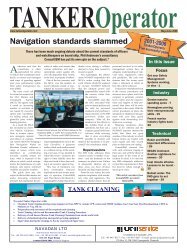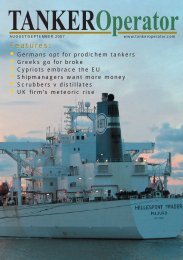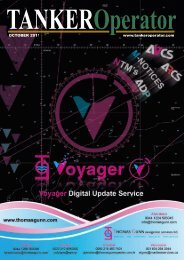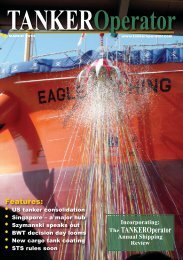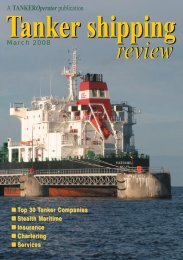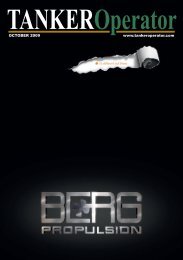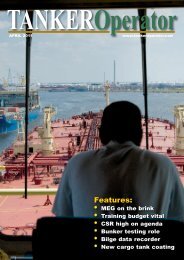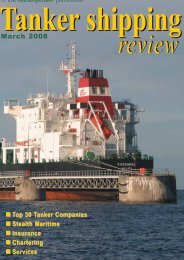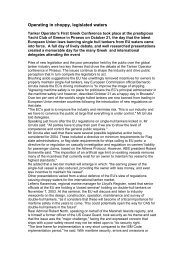Features: - Tanker Operator
Features: - Tanker Operator
Features: - Tanker Operator
You also want an ePaper? Increase the reach of your titles
YUMPU automatically turns print PDFs into web optimized ePapers that Google loves.
TECHNOLOGY - EMISSIONS<br />
IMO global sulphur<br />
regulations impact on<br />
marine pumps<br />
minimised<br />
Stricter sulphur limits being imposed by the IMO and other worldwide national<br />
authorities can significantly influence the operating conditions of marine fuel pumps.<br />
In a worst-case scenario, marine diesel<br />
fuel with low sulphur content and<br />
viscosity levels can damage components<br />
in fuel pumps – causing propulsive<br />
power failure or electrical blackout on a<br />
vessel, according to leading German pump<br />
manufacturer Allweiler.<br />
Under the most recent revision of Annex VI<br />
of Marpol 73/78, IMO has adopted stricter<br />
limits to cap the sulphur content of all marine<br />
fuels at 0.5% worldwide from 2020. This<br />
revision lowers current sulphur limits of 1.5%<br />
in Emission Control Areas (ECAs) – such as<br />
the Baltic and North Sea – to 1% in 2010 and<br />
0.1% in 2015. Additionally, EU Directives for<br />
2010 require ships in inland waterways and at<br />
berths to use marine fuel with 0.1% sulphur<br />
content.<br />
Achieving these goals demands technically<br />
and economically sound options, taking into<br />
consideration all ship subsystems.<br />
Allweiler, a Colfax business unit, fully<br />
supports IMO and other international<br />
initiatives to curb shipping emissions, but<br />
advises operators to check how new fuel<br />
parameters will affect the operating conditions<br />
of on board pumps. Lower sulphur marine<br />
diesel fuels exhibit lower viscosity and<br />
lubricity levels, thus affecting the performance<br />
of a wide range of pump brands in the marine<br />
market.<br />
Yuriy Vladimirov, technical superintendent<br />
of the Russian-based Novorossiysk Shipping<br />
Company (Novoship), believes that emerging<br />
emissions regulations will have a big impact<br />
on the industry.<br />
Shipowners face stringent demands by the IMO for 0.5% sulphur content in oil fuels by 2010.<br />
“The IMO, EU, US and Canadian<br />
authorities are moving quickly to restrict NOx<br />
(nitrogen oxides), SOx (sulphur oxides),<br />
particulates and CO2 emissions in ECAs,” he<br />
said. “We expect that maritime authorities in<br />
other regions will do the same.”<br />
Vladimirov explained that to reduce sulphur<br />
emissions, shipowners must either install<br />
exhaust scrubbers or use low-sulphur fuels,<br />
which are more expensive and can cause<br />
safety issues.<br />
“Low sulphur fuels are lighter, so they tend<br />
to leak more – creating a potential fire risk in<br />
the engine room,” he said. “In addition, these<br />
lighter fuels don’t lubricate as well, which<br />
may result in long-term damage to engine,<br />
boiler components and other equipment –<br />
including pumps.”<br />
Since many existing engine components are<br />
not designed to operate with lighter fuels,<br />
shipowners will have to install redundant<br />
systems and separate fuel tanks for heavy,<br />
diesel, and light fuels, which will allow them<br />
to switch to different fuel types when<br />
necessary. While there has been a lot of<br />
industry focus on boilers recently, pumps –<br />
which are especially critical to merchant ship<br />
operation – remain an issue of concern.<br />
“If pumps cannot reliably operate with<br />
lighter fuels, shipowners face significant safety<br />
and environmental risks,” said Vladimirov.<br />
“Through intensive checking, upgrades and<br />
replacements, Novoship has made all<br />
adjustments to guarantee the life cycle and<br />
functionality of pumps, regardless of the liquid<br />
handled and the substances it contains.”<br />
Novoship recognised market initiatives to<br />
manage risks associated with harmful<br />
emissions. For example, DNV has developed<br />
a class notation to manage emissions issues<br />
November/December 2009 TANKER<strong>Operator</strong> 37



